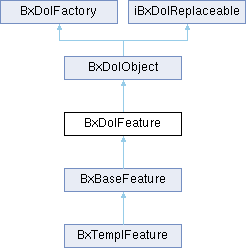Loading...
Searching...
No Matches
BxDolFeature Class Reference
Inheritance diagram for BxDolFeature:

Public Member Functions | |
| actionFeature () | |
| actionGetFeatureBy () | |
| isAllowedFeature ($isPerformAction=false) | |
| msgErrAllowedFeature () | |
| isUndo () | |
| doFeature () | |
| Public Member Functions inherited from BxDolObject | |
| init ($iId) | |
| getSystemId () | |
| getSystemName () | |
| getSystemInfo () | |
| getId () | |
| setId ($iId) | |
| isEnabled () | |
| isPerformed ($iObjectId, $iAuthorId, $iAuthorIp=0) | |
| getVote ($iObjectId=0, $bForceGet=false) | |
| getTrack ($iObjectId, $iAuthorId) | |
| getConditions ($sMainTable, $sMainField) | |
| getConditionsTrack ($sMainTable, $sMainField, $iAuthorId=0) | |
| getSqlParts ($sMainTable, $sMainField) | |
| getSqlPartsTrack ($sMainTable, $sMainField, $iAuthorId=0) | |
| getSqlPartsTrackAuthor ($sMainTable, $sMainField, $iObjectId=0) | |
| addMarkers ($aMarkers) | |
| getElementAPI ($aParams=[]) | |
| getCounterAPI ($aParams=[]) | |
| getQueryObject () | |
| checkAction ($sAction, $isPerformAction=false) | |
| checkActionErrorMsg ($sAction) | |
| onObjectDelete ($iObjectId=0) | |
Static Public Member Functions | |
| static | getObjectInstance ($sSys, $iId, $iInit=true) |
| static & | getSystems () |
| Static Public Member Functions inherited from BxDolObject | |
| static | pruning () |
Protected Member Functions | |
| __construct ($sSystem, $iId, $iInit=true, $oTemplate=false) | |
| _getIconDoFeature ($bPerformed) | |
| _getTitleDoFeature ($bPerformed) | |
| Protected Member Functions inherited from BxDolObject | |
| _getAuthorId () | |
| _getAuthorPassword () | |
| _getAuthorIp () | |
| _getAuthorInfo ($iAuthorId=0) | |
| _getAuthorObject ($iAuthorId=0) | |
| _trigger () | |
| _triggerValue ($iValue) | |
| _replaceMarkers ($mixed) | |
| _prepareParamsData ($aParams) | |
| _getRequestParamsData ($aKeys=array()) | |
| _prepareRequestParamsData ($aParams, $aParamsAdd=array()) | |
| _getTmplContentElementBlock () | |
| _getTmplContentElementInline () | |
| _getTmplContentDoAction () | |
| _getTmplContentDoActionLabel () | |
| _getTmplContentCounter () | |
| _getTmplContentCounterLabel () | |
Protected Attributes | |
| $_sType | |
| $_sBaseUrl | |
| $_aElementDefaults | |
| $_aElementDefaultsApi | |
| $_aElementParamsApi | |
| Protected Attributes inherited from BxDolObject | |
| $_oTemplate = null | |
| $_oQuery = null | |
| $_bApi = false | |
| $_iId = 0 | |
| $_sSystem = '' | |
| $_aSystem = array() | |
| $_aMarkers = array () | |
| $_sTmplContentElementBlock = '' | |
| $_sTmplContentElementInline = '' | |
| $_sTmplContentDoAction | |
| $_sTmplContentDoActionLabel = '' | |
| $_sTmplContentCounter = '' | |
| $_sTmplContentCounterLabel = '' | |
Detailed Description
Track any object feature automatically
Add record to sys_object_feature table to track object feature, to record feature just create this class instance with your object id, for example:
static getObjectInstance($sSys, $iId, $iInit=true)
Definition BxDolFeature.php:67
Description of sys_object_feature table fields:
`name` - system name, it is better to use unique module prefix here, lowercase and all spaces are underscored
`table_track` - table to track feature
`is_on` - is the system activated
`trigger_table` - table where you need to update feature field
`trigger_field_id` - table field id to unique determine object
`trigger_field_count` - table field where the featuring date is stored
`class_name` - your custom class name, if you overrride default class
`class_file` - your custom class path
Constructor & Destructor Documentation
◆ __construct()
|
protected |
Reimplemented from BxDolObject.
Member Function Documentation
◆ actionFeature()
| BxDolFeature::actionFeature | ( | ) |
Actions functions
◆ doFeature()
| BxDolFeature::doFeature | ( | ) |
Internal functions
Hooks:
'feature', 'undo' - hook on cancel feature
- $unit_name - equals
feature - $action - equals
undo - $object_id - report id
- $sender_id - profile_id for feature's author
- $extra_params - array of additional params with the following array keys:
object_system- [string] system name, ex: bx_postsobject_id- [int] feature object idobject_author_id- [int] author's profile_id for feature object_id
Hooks:
'feature', 'do' - hook on feature
- $unit_name - equals
feature - $action - equals
do - $object_id - report id
- $sender_id - profile_id for feature's author
- $extra_params - array of additional params with the following array keys:
object_system- [string] system name, ex: bx_postsobject_id- [int] feature object idobject_author_id- [int] author's profile_id for feature object_id
◆ getObjectInstance()
|
static |
get feature object instanse
- Parameters
-
$sSys feature object name $iId associated content id, where feature is available $iInit perform initialization
- Returns
- null on error, or ready to use class instance
◆ getSystems()
|
static |
Reimplemented from BxDolObject.
◆ isAllowedFeature()
| BxDolFeature::isAllowedFeature | ( | $isPerformAction = false | ) |
Permissions functions
◆ isUndo()
| BxDolFeature::isUndo | ( | ) |
Auxiliary functions
The documentation for this class was generated from the following file:
- inc/classes/BxDolFeature.php